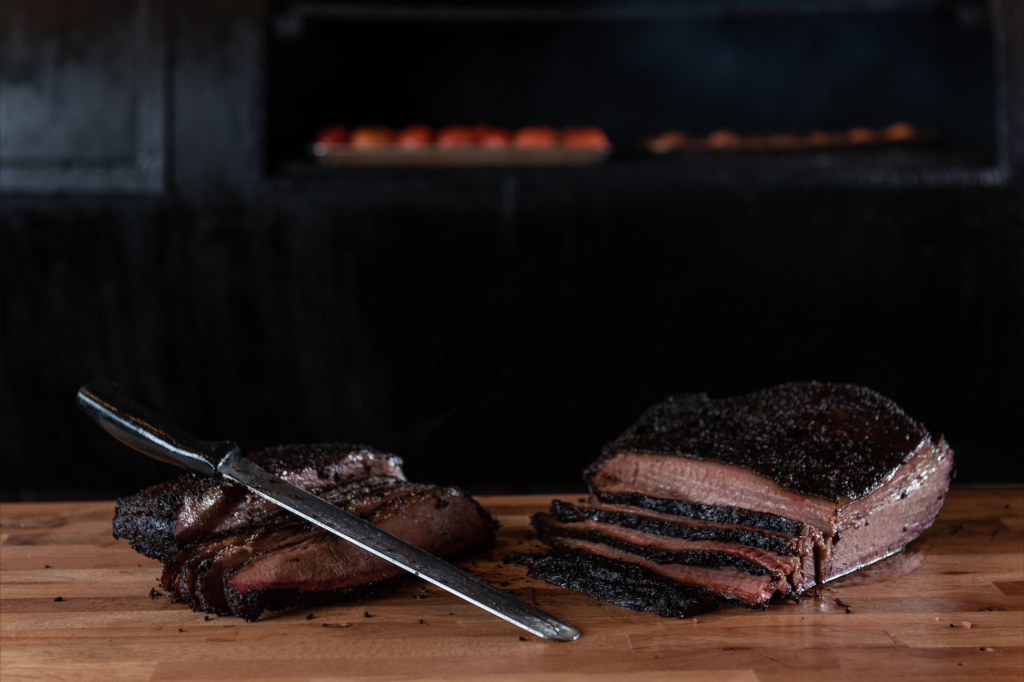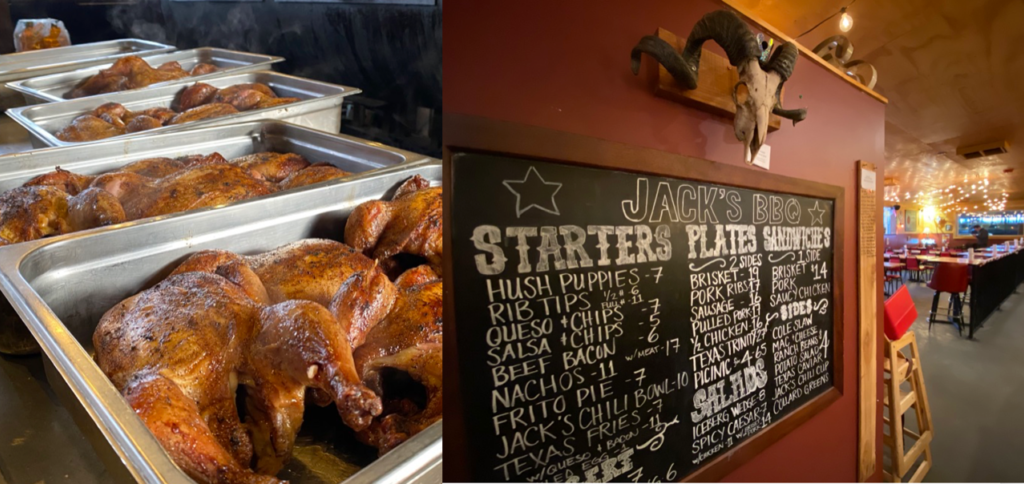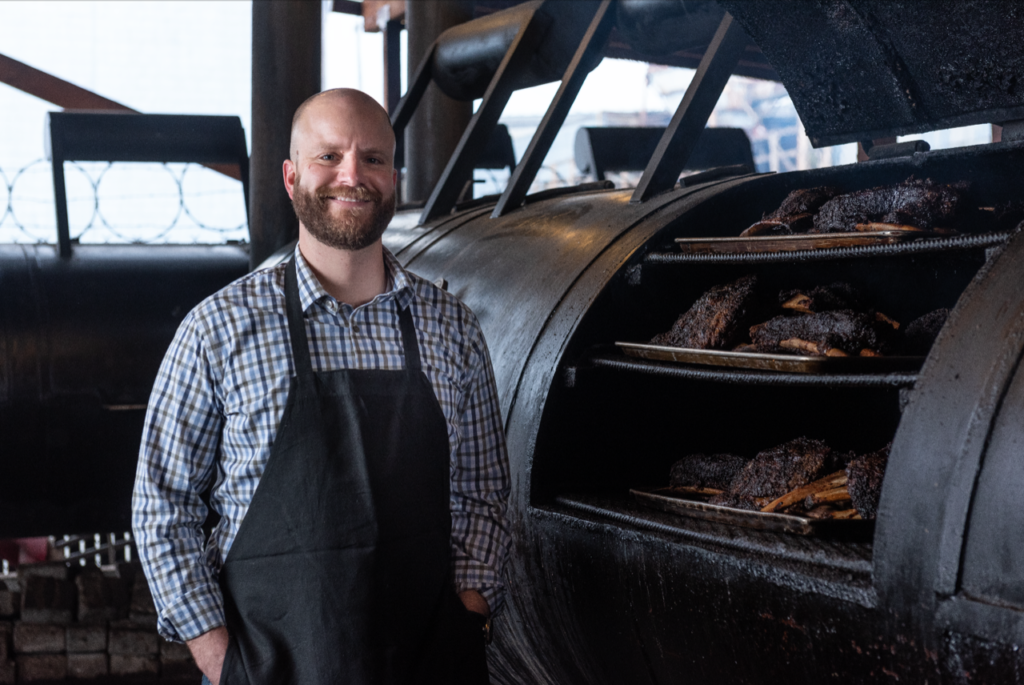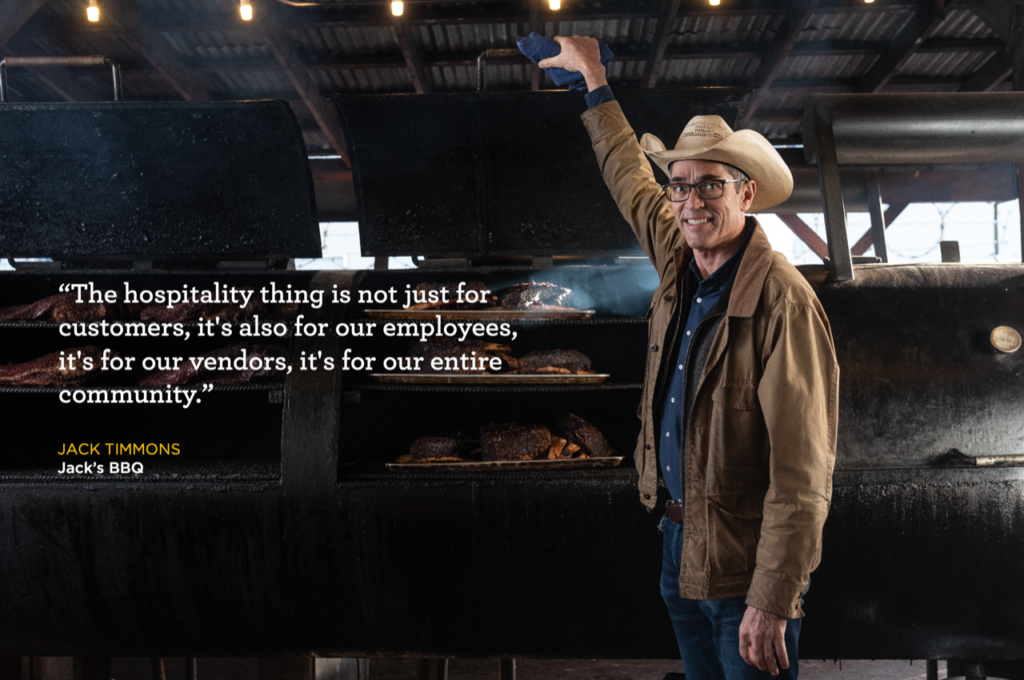Jack Timmons
Founder, JACK’S BBQ
A conversation with Jack Timmons, Founder, JACK’S BBQ Seattle | December 2019
Q: What does this business mean to you?
Jack: We opened Jack's BBQ five years ago in the fall of 2014, here in Georgetown or as many call it SoDo. And it's been a wild ride ever since. The first few years you're just trying to hire people and get settled to where you can actually run the business. You’re just putting out fires non-stop and all that, just like every restaurant story you've ever heard. But now that we're five years in, it's really different – the management team is mature and steady – we've learned a lot about how to run the business.
One of the more interesting aspects of this whole experience for me is how I’m engaged with the community at a much deeper level. In my previous life, I worked at big companies like Microsoft and Boeing and whatnot and was like a cog in the giant wheel. I went to an office and I came home. I didn't really feel that connected to Seattle, you know, other than being a Seahawks fan! But with this business, all my employees live and work here, and I know their stories, and I deal every day with vendors who are all based here, and local politicians come here, and the chief of police hangs out here… I'm really plugged in now and I feel very grounded. It feels like a much richer experience for me now. And you know, I'm not going anywhere. I'm in the low and slow business. I'll be here forever.
Q: What's it take to operate JACK’S?
Jack: We have about 80 employees. They're not all full time, of course. We've got three restaurants going, plus a ton of catering. So that's a lot of people. And we're about to open two more restaurants next year, hopefully, knock on wood. If all of that goes well, we'll double the numbers. So, it's becoming a reasonably sized business.

Q: What’s it taken for you to figure out catering? That’s a whole business in itself.
So, I love events. Before the restaurant, when I was deciding how can I try out the business, put my toes in the water, so to speak, I was either going to do events or a food truck. But food trucks are square boxes with little windows and the customer engagement is kind of tiny, and I'm a tall guy, right? So, we did events. We did monthly pop-ups. I called it the Seattle Brisket Experience. We sold tickets on the internet. I smoked in my backyard and we’d go to a brewery and have a big event. I’d hire a band and all that. And that was catering right. Once a month I do this big event for 100-150 people, cook all the food, you know, stay up late, the next day wash all the dishes for 6, 8 hours and all that damn near killed me. It was one of the hardest physical things I've ever done – incredibly taxing. And so, when we opened the restaurant, I was the catering guy for the first year or two, until we got a catering team and all that. It was like the hardest thing I've ever done in my life. So, once the business grew the first thing I did was get a catering manager, a young guy!
Q: Were there certain key lessons you learned in those early years that you kind of adopted into the operation?
Jack: Oh yeah, I think it's kind of ad hoc in the beginning and you learn to program it. I created a checklist. The most terrifying thing about catering for me was forgetting something. Or worrying about forgetting something. I could never relax on a catering gig until it was halfway done because I thought what if the briskets aren't right? Or what if I forgot something? And you would inevitably forget something, and you can't go get it, you're on-site, you kind of have to wing it, you've got a customer that's paying top dollar. So, I created a checklist that makes people check them twice. We started buying like real catering equipment. And I think the lessons are you just have to codify it. And I've learned over time, not just the delivery of it, but also the hospitality part of it. How you greet people, how do you dress, you know, what’s appropriate for a retirement party for some elegant person or something like that. I think it just took an amount of detail and organization to kind of to make it right. We’re quite obsessed with all of this now.
Q: What was that like to make the leap from all that you learned here in Georgetown and then say, “I'm gonna do it again” – your second location in the Columbia Tower?
Jack: It's kind of like having a baby. All of a sudden, you're done with diapers and you forget, for some reason you forget about the diapers... You have another baby, and all of a sudden, you know, you're back in the shit as it were. I thought was going to be easier, but what I learned is that opening a restaurant in Seattle, in general, is never going to be easy. It's complicated. And if you're doing a build-out, it's super complicated because the labor you have to hire, the permits you have to get, all the complexities of doing any project in a big city with lots of regulations. You know, with the original restaurant we bought a dive bar, painted it, hung some jackalopes on the wall – it's a BBQ joint. Downtown was a different story, taking a piece of office space in a precious building with a million rules and regulations and trying to turn it into a cozy, cool, laid-back, Austin Roadhouse-style barbecue joint was hard. But we did it.

Q: Contrast that experience to what you imagine you're going to run into with your next locations on the eastside or down south?
Jack: We're only buying old dive bars or old restaurants. That's what we're doing. It's kind of like we found our soul after a while. We've tried everything, we tried live music…that's a whole other business. We've been at the baseball and football stadiums, we've talked about being at the airport, and what you kind of learn over time those places, they don't capture your real essence. I mean, they're a way to make money, but it doesn't have that warm feel with the fire pits outside in a bigger space. So, we see how we’ve got to be real, to have hospitality with our customers. It's not just cranking through a lunch. For us, it's more soulful to do the places as we know them.
As you grow, you have opportunities, you get invited to do lots of things. You just have to figure out what’s most genuine, where is my real passion?
Q: How has that clarity helped you, or not, with decisions on culture, staff, your brand?
Jack: In the beginning, you say yes to every opportunity because you're just trying to stay alive. Once you're up and running, you have time to think about the future, and be more deliberate. I just read a book that most people in the industry have read, Setting the table by Danny Meyers. He's the guy that opened Gramercy Tavern and Union Square Grill in New York…Shake Shack burgers. And he’s found a way to kind of codify the hospitality side of it. At JACK’S, we have pillars that our company is based on. And we've had them since the beginning. One is Authenticity, which is all about the barbecue and the central Texas-style and how we do things, the low and slow, the way we burn wood every day to smoke our meats. And the other is Hospitality, in my case, kind of southern hospitality and graciousness, really connecting with the customer. And the other one is Experience. Like, have you set the stage appropriately? It impacts everything. Is the parking lot clean? The moment the customers is driving down the street…is their experience going to be right?
And so, I've written those pillars up, and we use them as part of our training for every person that comes into the restaurant. I've introduced some of Danny Meyers’ concepts into how we do our hiring, and how we do reviews in terms of prioritizing the hospitality portion – it’s a larger percent of the review than just the surface level. Did you get the food on time? Did you answer the phone within three rings? Did you do this? Did you do that? That's all interesting and has to be done. But on top of that, you have to have that human connection where you're actually engaging the customer, you're figuring out what they're about in the moment. Beyond awesome BBQ, why are they here? What kind of experience do they want? How can I make them feel better or feel great about their decision to eat here? And you know, how can I create some kind of experience for them so that they remember it and they want to come back? This is at the heart of our business.
Q: Is there a similar application of these pillars in back of the house and kitchen staff. Has that worked?
Jack: Yeah, the kitchen has been more challenging. I'm not from the restaurant industry and it's like a whole culture back there. I've got the hospitality thing as part of my DNA. I've hired kitchen managers who can really make that shine. There's a lot of feeling in our kitchen staff. Stew and the team bring out the best in all of them. I think they do feel like family, like the way we treat them. The hospitality thing is not just for customers, it's also for your employees, it's for your vendors, it's for the community. We spread those pillars of authenticity and hospitality across our whole world. And so, with the kitchen guys, they have a lot of fun, I allow them to be creative. When we have special events, I encourage them to come up with new ideas and stuff like that. They throw out concepts for new events, like Thanksgiving whole meals for everybody. We just did 120 turkeys and a lot of everything else that goes with the whole meal. That was their idea.
On our best days, everybody's working in a warm and loving kind of way. The guys in the kitchen love it that we're like a family. Like everybody gets along with each other. You know, one of the things I’ve learned in business is you don't hire people with trauma. People that are wound up, you know, exploding at the seams, those people seem like great hires in the beginning because they get so much done. But then something always goes wrong and they go crazy and they get yelling at other people and they just don't fit in in a family way. So, we want people that are naturally friendly and naturally.

Chef Stew Navarre, Director of Operations, JACK’S BBQ
I wanted to base the restaurant on a solid foundation where I could tell people “here's what this is all about.” It's kind of like as a human. What's your story? What did you do with your life? I think the same thing for your restaurant. If it's a burger joint, you want to say I had the best damn burgers. And the friendliest staff, or the best happy hour, or people just loved my place. You want to be clear on the essence of the experience.
Q: What would you say to other operators about this pillar or essence stuff?
Jack: I'd say you need a story. You need something that says here's why. My place. Whatever your place is. It's a pizza place. Coffee shop or whatever. What do I want the memory of this place to be in 20 years? What are you trying to share with the world? What's at the bottom of it beyond the food and the service that makes it special for you and for your customers?
It can help create a thing that's bigger than the business. The level up beyond paying the bills and making a living is that I'm making people happy. I'm entertaining people. I’m taking people for coming off the street and I'm changing their day. I'm giving them a very warm, loving place to come enjoy life, relax and have some great food. So, it's a higher cause.
You know, before all this I had a high-tech job. I worked on little product features and I just didn't care that much. I didn’t actually know the person that was using the product. You right-click on this thing and this pops up and this then happens, but it wasn't fulfilling. Whereas in this business, like we're making people happy. We're delighting people with a warm hello and how you doing and welcome back and glad to see you and you just see them melt into a different state of existence.
Q: You are 5-plus years into this business. If you could go back in time and give yourself some advice, sharing the perspective you have now…is there any particular lesson-learned?
Jack: Ha. That's a tough one. It's such a tumultuous business. I feel like I tell people, I've aged like Obama eight years later. It’s probably about all our staff, you know – you have to hire good people. And that takes time. You know, some of the business practices that have been very successful for us are things like looking at the P&L statement on a weekly basis across all three restaurants to see exactly where they're headed. And because it's a low-profit margin business, and you're always turning the dials to make sure you're profitable. It's easy to have a dream and be a great cook and to put out good food, but you have to run the business appropriately like that. So that's a big, big lesson learned, I think.

And for me, another thing is just being nice to people as you go along. It's easy to get mad at people like the construction guys and stuff, some of those projects are a pain, but you have to think long term. You have to think like you're a business owner and the CEO of your little company. What you say matters to a lot of people. So, you have to be nice and you have to reflect on what you say before you say it because what you say actually gets listened to more than you think it does. Because people are actually keyed into you at that point. So, you just have to be a little more aware. A little more patient and always a little more kind.
Q: That's a good reminder for all of us.
Jack: Yeah. Kind of the secret to life. Measure twice and cut once.